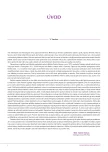-
Medical journals
- Career
Doing sport with an implantable pacemaker or cardioverter/defibrillator
Authors: V. Vančura
Authors‘ workplace: Kardiologická klinika IKEM, Praha
Published in: Kardiol Rev Int Med 2007, 9(Mimořádné): 39-44
Category: Editorial
Overview
Sports and pacemakers or implantable cardioverters/defibrillators. As the number of patients with implanted pacemakers and cardioverters/ defibrillators (ICD) grows there is a growing number of people with these devices who wish to participate in sports. While the only limitation for patients with pacemakers is to avoid the danger of bodily collision which could damage the device or the lead, the limitations in the ICD patients are more extensive. Usually, they are advised to restrict their sporting activities to the least demanding sports. The requirements laid on the cardiovascular system during sports require proper setting of stimulation parameters in pacemakers and appropriate setting of ICD devices, that prevents inappropriate therapeutic interventions.
Keywords:
sport – implantable pacemakers – cardioverters/defibrillators – resynchronisation therapy – CRM apparatuses
Sources
1. Heidbuchel H, Panhuyzen-Goedkoop N, Corrado D et al. Recommendations for participation in leisure-time physical activity and competitive sports in patients with arrhythmias and potentially arrhythmogenic conditions Part I: Supraventricular arrhythmias and pacemakers. Eur J Cardiovasc Prev Rehabil 2006; 13(4): 475-484.
2. Heidbuchel H, Corrado D, Biffi A et al. Recommendations for participation in leisure-time physical activity and competitive sports of patients with arrhythmias and potentially arrhythmogenic conditions. Part II: ventricular arrhythmias, channelopathies and implantable defibrillators. Eur J Cardiovasc Prev Rehabil 2006; 13(5): 676-686.
3. Zipes DP, Ackerman MJ, Estes NA 3rd et al. Task Force 7: arrhythmias. J Am Coll Cardiol 2005; 45(8): 1354-1363.
4. Maron BJ, Zipes DP. Introduction: eligibility recommendations for competitive athletes with cardiovascular abnormalities-general considerations. J Am Coll Cardiol 2005; 45(8): 1318-1321.
5. Lampert R, Cannom D, Olshansky B. Safety of sports participation in patients with implantable cardioverter defibrillators: a survey of heart rhythm society members. J Cardiovasc Electrophysiol 2006; 17(1): 11-15.
6. Surmely JF, Mohacsi P, Schmid JP et al. For gold, heart rate matters. J Heart Lung Transplant 2005; 24(8): 1171-1173.
7. Erol-Yilmaz A, Schrama TA, Tanka JS et al. Individual optimization of pacing sensors improves exercise capacity without influencing quality of life. Pacing Clin Electrophysiol 2005; 28(1): 17-24.
8. Mathony U, Schmidt H, Groger C et al. Optimal maximum tracking rate of dual-chamber pacemakers required by children and young adults for a maximal cardiorespiratory performance. Pacing Clin Electrophysiol 2005; 28(5): 378-383.
9. Sharma AD, Rizo-Patron C, Hallstrom AP et al. Percent right ventricular pacing predicts outcomes in the DAVID trial. Heart Rhythm 2005; 2(8): 830-834.
10. Wonisch M, Lercher P, Scherr D et al. Influence of permanent right ventricular pacing on cardiorespiratory exercise parameters in chronic heart failure patients with implanted cardioverter defibrillators. Chest 2005; 127(3): 787-793.
11. Vollmann D, Luthje L, Schott P et al. Biventricular pacing improves the blunted force-frequency relation present during univentricular pacing in patients with heart failure and conduction delay. Circulation 2006; 113(7): 953-959.
12. Lin MS, Lin JL, Liu YB et al. Immediate impairment of left ventricular mechanical performance and force-frequency relation by rate-responsive dual-chamber, but not atrial pacing: Implications from intraventricular isovolumic relaxation flow. Int J Cardiol 2006; 109(3): 367-374.
Labels
Paediatric cardiology Internal medicine Cardiac surgery Cardiology
Article was published inCardiology Review

2007 Issue Mimořádné-
All articles in this issue
- Practical issues in differentiating athlete’s heart from hypertrophic cardiomyopathy
- Bradycardia in athletes
- Supraventricular arrhythmias in elite athletes
- Sudden death and sport
- Doing sport with an implantable pacemaker or cardioverter/defibrillator
- Physiology of physical strain
- Negative impact of doping on the cardiovascular syste
- Cardiology Review
- Journal archive
- Current issue
- Online only
- About the journal
Most read in this issue- Practical issues in differentiating athlete’s heart from hypertrophic cardiomyopathy
- Bradycardia in athletes
- Physiology of physical strain
- Doing sport with an implantable pacemaker or cardioverter/defibrillator
Login#ADS_BOTTOM_SCRIPTS#Forgotten passwordEnter the email address that you registered with. We will send you instructions on how to set a new password.
- Career

